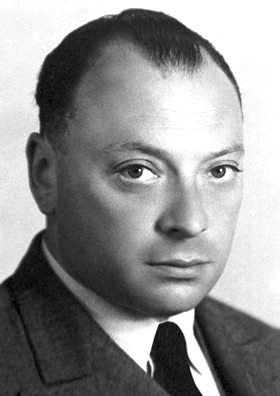Wolfgang Pauli

Wolfgang Pauli. From
"Wolfgang Pauli" Wikipedia
http://en.wikipedia.org/wiki/Wolfgang_Pauli
Early life
Wolfgang Pauli was born on April 25, 1900
in Vienna, Austria [1].
Pauli was the son of Wolfgang Joseph Pauli, a well-known
physician and professor of chemistry, and Bertha Pauli (née
Schütz), who worked for a Viennese newspaper. The couple had
one other child, a daughter named Hertha, born in 1906.
Wolfgang Pauli was the godson of the physicist and
philosopher Ernst Mach [2].
Education and Rise to Prominence
In 1921, Pauli completed his doctorate, having studied under Arnold Sommerfeld at the University of Munich [3]. During this time, he wrote a review of the theory of relativity for the Encyklopädie der Mathematischen Wissenschaften (Encyclopedia of Mathematical Sciences). This review was very well received by the physics community, earning Pauli praise from many physicists, including Albert Einstein himself [4].
Discovery of the Exclusion Principle, Personal Troubles, and Proposal of Neutrinos
After completing his doctorate, Pauli spent a year as an assistant to Max Born at the University of Göttingen, after which he spent a year with Niels Bohr at Copenhagen. Pauli was a lecturer at the University of Hamburg from 1923-1928 [5]. It was during this time that Pauli first proposed what would come to be known as the Pauli exclusion principle [6]. Following his time in Hamburg, Pauli became a professor of theoretical physics at the Federal Institute of Technology in Zurich. During his time in Zurich, Pauli proposed the existence of neutrinos [7]. During this time Pauli also acted as a visiting professor in several American universities, including: the University of Michigan (in 1931 and 1941), Princeton University (1935-1936), and Purdue University (1942) [8].
In 1927 Pauli’s mother committed suicide [9]. This, along with his divorce from his first wife, Käthe Deppner, led him to psychoanalysis [10]. Pauli saw the famous psychologist Carl Gustav Jung for two years, from 1932-1934 [11]; however, the two of them remained in correspondence for almost the entirety of Pauli’s life [12]. In 1934 Pauli also married his second wife, Franciska Bertram [13].
WWII and After
In 1940, Pauli left Zurich and took a guest professorship at Princeton to avoid the threat of Nazi persecution, as his paternal grandparents were Jewish [14]. In 1945, Pauli was awarded the Nobel Prize in Physics for his discovery of the Pauli exclusion principle [15]. In 1946 Pauli was granted American citizenship, however he returned to Europe to accept his Nobel Prize, and to resume teaching at the Federal Institute of Technology in Zurich. In 1949, he was awarded Swiss citizenship [16]. Pauli remained in Zurich until his death in 1958 [17].
Works Cited
[1] Wolfgang Pauli. Encyclopaedia Britannica
[2] Wolfgang Pauli-Biographical. Nobelprize.org
[3] Wolfgang Pauli, birth and childhood in Vienna. ETHZ (Swiss Federal Institute of Technology Zurich)
[4] Wolfgang Pauli-Biographical. Nobelprize.org
[5] Wolfgang Pauli. Encyclopaedia Britannica
[6] Wolfgang Pauli-Biographical. Nobelprize.org
[7] Pauli's Principle. ETHZ
[8] The Neutrino. ETHZ
[9] Wolfgang Pauli-Biographical. Nobelprize.org
[10] Wolfgang Pauli. Encyclopaedia Britannica
[11] Wolfgang Pauli. Encyclopaedia Britannica
[12] Wolfgang Pauli. Encyclopaedia Britannica
[13] Wolfgang Pauli-Biographical. Nobelprize.org
[14] Wolfgang Pauli. Encyclopaedia Britannica
[15] Wolfgang Pauli-Biographical. Nobelprize.org
[16] Wolfgang Pauli. Encyclopaedia Britannica
[17] Wolfgang Pauli-Biographical. Nobelprize.org